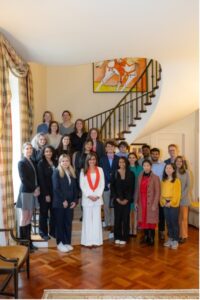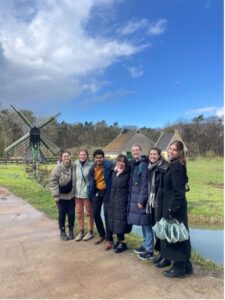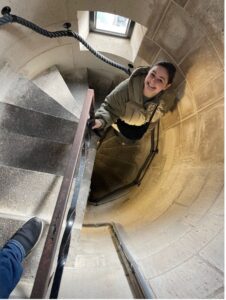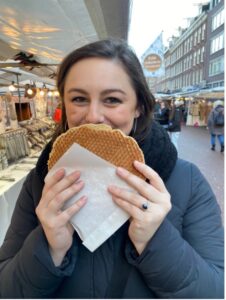“A Reflection of My Fulbright Year”
by Hannah Banks
As the first year of my master’s program in Global Health: Research comes to a close at Vrije Universiteit (VU) in Amsterdam, I’m left reflecting on my Fulbright year as it is also ending in just a few short months. Thinking back to the beginning of my Fulbright year, I had no idea what this year would have in store for me. From meeting the U.S. Ambassador to all of the Fulbright excursions in different cities, this experience has been full of growth and excitement.


Before coming to the Netherlands, I received my bachelor’s degree in Anthropology from Western Kentucky University and then I served as an AmeriCorps VISTA Member for two years at the Public Health Institute in Oakland, California. It was these two experiences that truly inspired me to pursue my master’s degree abroad because I was shown the value of addressing health equity on a global scale. I was drawn to this master’s program because of its focus on transdisciplinarity and learning strategic ways to include multiple disciplines and community members throughout research processes. During the first half of my Fulbright year, I took courses like Global Health Interventions and International Comparative Analyses of Health Care Systems where I learned the ins and outs of designing health interventions in both high- and low-income countries along with the methods to monitor and evaluate such interventions.
In this last half of my Fulbright year, I have been serving as an intern on an EU-funded project called NATURELAB which aims to integrate Nature-Based Therapy (NBT) into health systems to enhance the health and well-being of communities. This internship has given me the opportunity to complete independent research that is nested within the wider NATURELAB project. I am currently conducting mixed methods research about the acceptability of NBT in the Netherlands with the VU research team for the NATURELAB project at the Athena Institute. Throughout this internship, I have been able to deepen my qualitative skills through analyzing and coding key informant interviews as well as growing my quantitative skills by creating a public perception survey about the acceptability of NBT. Gaining this research experience has been incredibly beneficial because I’ve been able to work alongside researchers from different disciplines to see how research that is being conducted across five countries all comes together to support one objective.
Although my Fulbright year has kept me incredibly busy between coursework and internships, the Stichting Fulbright Commission has put together so many outings and excursions that showcase different aspects of Dutch culture, even the rain. Each Fulbright excursion from The Hague to Arnhem were all accompanied by the rain, so I quickly learned the Dutch saying that “you are not made of sugar, you won’t melt in the rain.” Jokes about the weather aside, the excursions were wonderful experiences that brought current Fulbrighters together to connect and to learn more about the Netherlands outside of the classrooms or labs. Each outing showed me something different about Dutch culture whether that be about art, history, or architecture. This Fulbright experience has truly showed me the importance of cross-cultural learning and connection. I’ve learned so much from the Dutch Fulbright alumni that I’ve had the opportunity to connect with, the people in my master’s program, and my fellow Fulbrighters this year.











